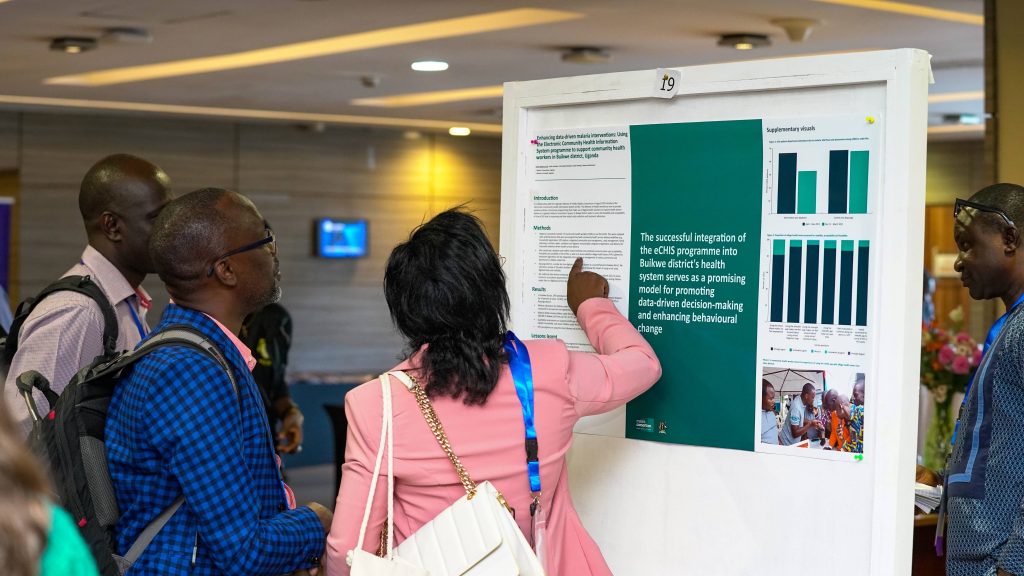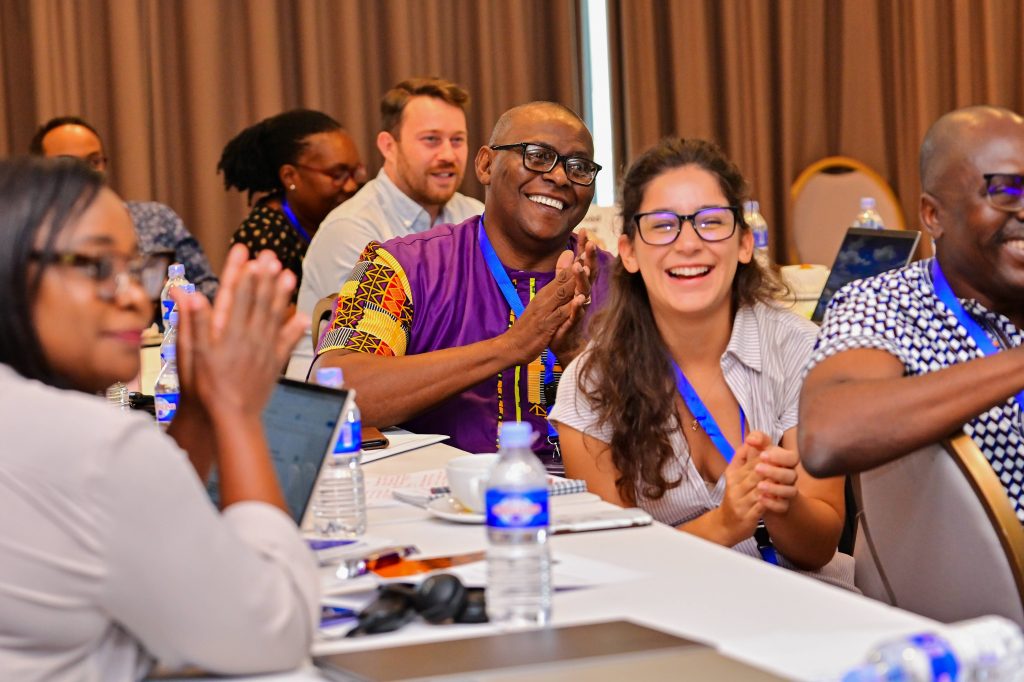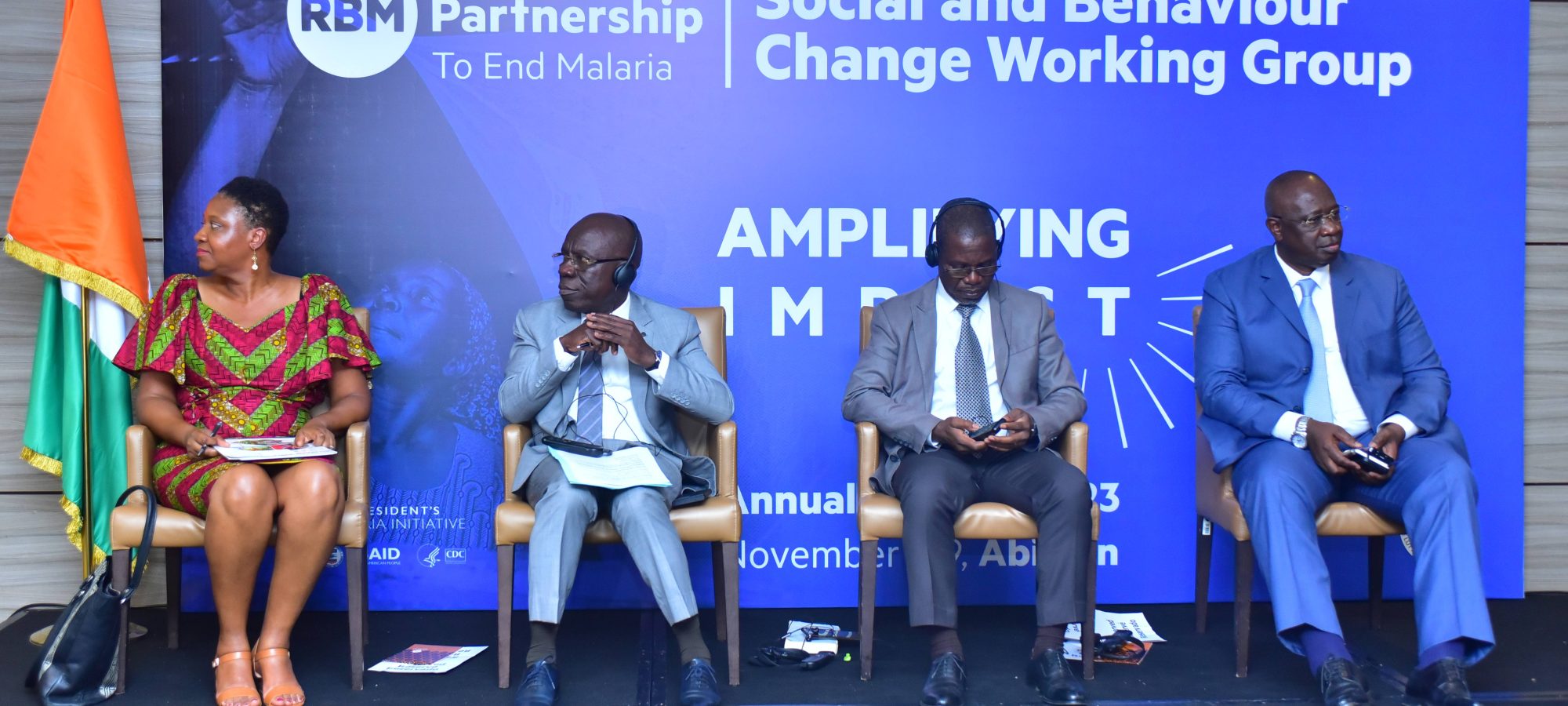As the team from Malaria Consortium interacted with over 130 delegates at the 2023 RBM Partnership to End Malaria Social and Behaviour Change Working Group meeting in Abidjan under the topic ‘Amplifying Impact’, the air buzzed with innovative ideas and engaging strategies. From embracing digital tools to leveraging behavioural science for developing effective programming, there are many ways we can chart a course in malaria social and behaviour change (SBC) that is as cost-effective as it is impactful.
According to the World Malaria Report 2023, in 2022, there was estimated 580,000 malaria deaths in the World Health Organization (WHO) Africa Region, the majority of which were among children under the age of five, the high number compounded by a lack of access to malaria prevention and treatment tools. Impactful malaria programmes are those that increase access to lifesaving tools whilst also recognising that the acceptance of these tools by communities and the related behaviour change is fundamental to their success. By integrating behavioural science, agile adaptive social and behaviour change programming, outcome monitoring and evaluation, tailored community-led action, and digital strategies, programmes can better address the unique challenges posed by malaria.
We share our key takeaways from the event and how we can incorporate these in our collective efforts to make malaria history.
Agile, adaptive SBC programming
The meeting highlighted the importance of being agile and prepared to act, adapt and innovate to maintain the effectiveness of behaviour change interventions in the face of an ever-changing public health landscape. With two malaria vaccines being given the green light as effective and safe for use in children at risk, vaccine implementation will now form part of malaria programming alongside the existing toolbox of preventive, diagnostic and treatment tools used to combat malaria, including the use of long-lasting insecticidal nets, indoor residual spraying, chemoprevention treatments and effective case management. In our fight against malaria, it’s the swift pivot in strategy that can outmanoeuvre the parasite’s resilience.
Harnessing the potential of digital platforms
Effective malaria SBC programmes are fundamentally anchored in the interplay of strong surveillance and efficient generation and use of data for decision-making. Digital tools that strengthen community health programmes are key to delivering high quality and equitable health services, particularly in hard-to-reach communities. But tools need to be trialled, tested, and refined with a small number of users before being rolled out at scale.
In 2020, Malaria Consortium, in collaboration with the Ugandan Ministry of Health (MoH) and the national Buikwe local government, implemented a digitalised community health toolkit — an app that feeds into the country’s electronic Community Health Information System (eCHIS). This toolkit supported over 300 Village Health Teams working with populations living five kilometres or more from a public health facility by extending the case management of key childhood illnesses including malaria and our results, presented at the event, demonstrate a scalable model for promoting data-driven decision-making and enhancing behavioural change in similar contexts.

Digitally monitoring interventions in real-time is affordable, generates better quality data and adds to the evidence-base at scale enabling more reliable data for rapid decision making. Also, interactive and engaging content (videos, games etc.) augment reach and engagement of diverse audiences and enrich supervision and capacity development through both the sharing and discussion of easily updatable content, and by facilitating connections through mobile apps, and online.
Leveraging behavioural science to develop effective programming
Behaviour change is complex, influenced by various psychological, socio-economic and environmental factors. By understanding the intricacies of human decision-making processes, motivations, and challenges, we can design interventions that target specific behavioural triggers and resonate with individuals, making the adoption of healthy measures more likely.
At the community level, SBC can target specific behaviours to bolster malaria prevention and health-seeking behaviour, emphasising community engagement. At the health facility level, SBC interventions can enable individuals to critically assess their actions and adopt positive behaviours that enhance decision-making.
Helen Hawkings, Malaria Consortium’s Social and Behaviour Change Specialist, delivered a storytelling workshop at the event, applying lessons from behavioural science to strengthen malaria SBC. Stories can connect to and resonate with audiences through using a story arc and including vivid contextual descriptions and emotions as well as scientific evidence.

Embracing integrated approaches
Integrating work with national malaria control programmes and other health and non-health sector programmes can increase efficiency and reach and optimise resources to generate greater impact. Investing in strengthening inter- and cross-sectoral partnerships as well as public-private-philanthropic (PPP) partnerships is vital to address complex challenges including ensuring quality-assured malaria services reach everyone, foster comprehensive behaviour change, and understand causality. By integrating work with national malaria control programmes, and other health and non-health sector programmes, we can increase SBC efficiency and reach and optimise resources to generate greater impact.
Tailored community-led action, which prioritises engaging local entities and communities in equitable partnerships and strengthens community leadership, facilitates contextually relevant and sustainable SBC programming. Increased cross-border initiatives for information sharing and data-driven decision-making are also needed to improve effectiveness of programmes with mobile populations.
Monitoring and evaluation
In low- and middle-income settings, it is essential to adopt efficient and cost-effective methods for monitoring and evaluation (M&E) to not only demonstrate the outcomes of SBC programmes but also to continuously improve and learn from them. Process and outcome monitoring, which involve assessing the quality of the intervention and the immediate effects resulting from project activities, are practical alternatives to more resource-intensive studies. Process monitoring ensures that programme activities are executed as planned and identifies operational improvements, while outcome monitoring provides early indicators of effectiveness.
Integrating rapid assessments and digital tools in M&E also offers a blend of agility and precision and by incorporating a blend of these methods, we can make informed decisions to adapt and refine our strategies, ensuring that our SBC programmes are responsive and effective. This approach not only charts a course in SBC that maximises the impact of limited resources but also turns these resources into opportunities for limitless possibilities. In upcoming Malaria Consortium projects, we plan to further tailor these M&E approaches to the unique challenges of the setting, applying lessons learned and engaging communities in the M&E process, thereby enhancing the overall impact and sustainability of our SBC initiatives.
As the curtains close on the tenth working group, the echoes of our discussions and insights continue to resonate. It’s clear that our fight against malaria is not just about the tools we use but how we use them. Let’s be the harbingers of change, one proactive step, one simplified message, and one agile strategy at a time. Join the movement, share your insights, and let’s make malaria history.
All presentations made by Malaria Consortium at the 2023 RBM Partnership to End Malaria Social and Behaviour Change Working Group meeting are available for download on our publications database:
- Poster: Enhancing data-driven malaria interventions: Using the Electronic Community Health Information System programme to support community health workers in Buikwe district, Uganda
- Poster: Reversing the malaria upsurge in Uganda: The game-changing role of social and behaviour change
- Poster: Leveraging data-driven approaches for malaria social and behaviour change programming in conflict-affected communities of the Southwest and Littoral regions of Cameroon
- Poster: Social and behaviour change matters for data quality: Lessons from strengthening Mozambique’s malaria surveillance system for informed decision-making
If you would like to know more about Malaria Consortium’s SBC work, please email [email protected]
